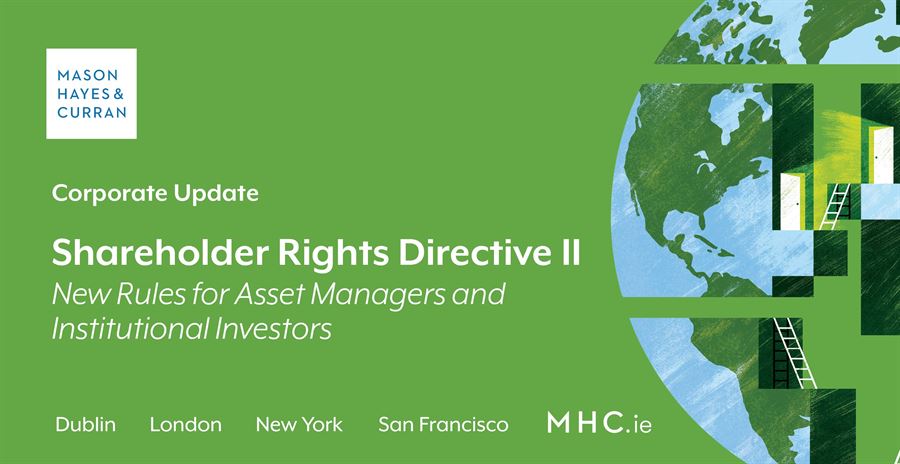
The second Shareholders’ Rights Directive (SRD II) puts a new focus on encouraging long-term shareholder engagement in listed companies, in particular by addressing new obligations to asset managers, institutional investors and proxy advisors.
The Irish regulations implementing SRD II (the Regulations) were adopted in March 2020 and introduce three new chapters into Part 17 of the Companies Act 2014:
-
Chapter 8A (Rights of Shareholders) – which covers the identification of underlying shareholders and information flows between underlying shareholders and companies. Read our article on this Chapter here.
-
Chapter 8B (Transparency of institutional investors, asset managers and proxy advisors) – which provides new transparency obligations for these sectors with the objective of encouraging shareholder engagement and the development of long term investment strategies, and
-
Chapter 8C (Remuneration Policy, remuneration report and transparency and approval of related party transactions) – which covers shareholder approval of directors’ remuneration and related party transactions. Read our article on this Chapter here
We examine Chapter 8B (Transparency of institutional investors, asset managers and proxy advisors), which took immediate effect in March 2020.
 Shareholder engagement and transparency obligations of institutional investors and asset managers
Shareholder engagement and transparency obligations of institutional investors and asset managers
Unlike other areas of the Regulations, i.e. where Ireland has exercised a Member State option to exempt them, Chapter 8B also applies to UCITS and AIFs.
For these purposes, the term “asset manager” covers authorised investment firms, AIFMs, UCITS management companies and self-managed UCITS and the term “institutional investor” means EU life insurers and EU pension funds. However, the Regulations only apply to asset managers and institutional investors that invest in shares traded on an EU regulated market.
The new requirements imposed by Chapter 8B mean that asset managers and institutional investors must:
-
Develop and publicly disclose an engagement policy, and
-
Make certain disclosures with respect to investment strategy
Engagement Policy – a ‘comply or explain’ requirement
With a view to promoting shareholder engagement, asset managers and institutional investors are now obliged to develop and disclose a shareholder engagement policy on their website, or alternatively disclose on their website why they have chosen not to do so. The engagement policy must cover how shareholder engagement is integrated into a manager or investor’s investment strategy and how it monitors the companies it invests in on matters such as strategy, financial and non-financial performance and how it exercises voting rights.
Asset managers and institutional investors must now report annually on the implementation of the engagement policy, including voting behaviour and explanations of the most significant votes taken. The report must include information on the use of the services of proxy advisors.
An asset manager must additionally comply with the applicable conflicts of interest requirements in relation to its shareholder engagement activities.
Transparency of asset managers
An asset manager that invests on behalf of an institutional investor must make annual disclosures directly to the institutional investor with specific information relating to its investment strategy. This disclosure must include how that strategy, and its implementation, complies with asset manager’s arrangement with the institutional investor to invest on its behalf. It must also cover how the strategy contributes to the medium to long-term performance of the assets and other key details of the strategy and portfolio.
Investment strategy and asset management disclosures by institutional investors
With a view to promoting a longer-term outlook in investment strategies, institutional investors are obliged to make public disclosure of how the main elements of their equity investment strategies are consistent with the profile and duration of their liabilities, in particular their long-term liabilities. Institutional investors are also required to make public disclosures on arrangements with asset managers that invest on its behalf as to how those arrangements incentivise the asset manager to align its strategy with the institutional investor’s liabilities and make investment decisions based on assessments about the medium to long-term financial and non-financial performance of the investee company.
Transparency obligations of proxy advisors
The proxy advisory industry, the most prominent members of which are ISS and Glass Lewis, provides research and voting recommendation services to shareholders. SRD II directly addresses proxy advisors for the first time in EU law, by imposing new transparency requirements on this sector.
Under the new requirements, a proxy advisor must publicly disclose the code of conduct that it applies and to report annually on its application. Where a proxy advisor departs from the code of conduct, the proxy advisor must publicly disclose such departures on an annual basis, and give explanations for them.
To this end, the principal proxy advisers operating in the EU have published a joint code of conduct that was recently updated with a view to meeting the “comply or explain” requirements of SRD II.
A range of information must also be disclosed by proxy advisors in relation to the preparation of their research, including the essential features of their methodologies and the main information sources that they use.
Though the number of proxy advisors is small, the Irish Regulations have specific relevance to Glass Lewis, which operates in the EU via an office located in Ireland and an Irish incorporated operating company.
Conclusion
With the objective of promoting shareholder engagement, SRD II imposes new transparency obligations on the asset management industry to explain their approach to shareholder engagement and to make disclosures to institutional investors where they invest on their behalf.
These obligations apply immediately, without a transitional period, and as a result, asset managers and institutional investors need to review and update their shareholder engagement polices and prepare the disclosures and annual reports that are required under the new regime.
For more information on the new obligations for asset managers and institutional investors brought about by SRDII, contact a member of our Corporate team.
The content of this article is provided for information purposes only and does not constitute legal or other advice.




